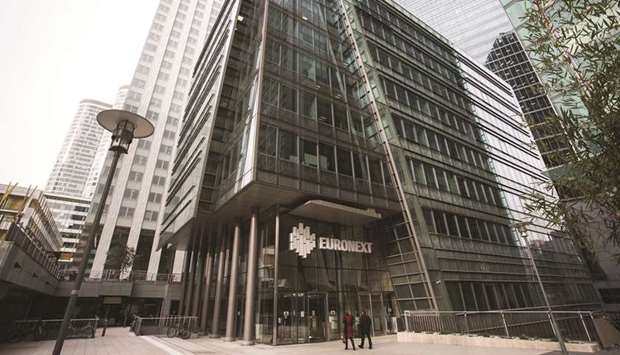Global markets had a pallid end of week hue yesterday as investors fretted over renewed coronavirus restrictions, the stuttering global economic recovery, and US lawmakers’ failure to agree on new stimulus measures.
In Europe, London, Frankfurt and Paris stocks all lost ground after a lacklustre lead from Asia while the Dow was flat two hours into the week’s final session.
World oil prices held the line having initially received a small fillip after Saudi Arabia pressed Opec and its allies to comply fully with production cuts to help stem this year’s virus-driven losses.
But it is the ongoing health crisis which continues to spook investors as the Covid-19 pandemic shows no sign of easing, a swathe of fresh spikes around the world prompting the reimposition of fresh containment measures including lockdowns.
“Coronavirus dominated the session,” said Connor Campbell, analyst with Spreadex, seeing a raft of new restrictions notably in northeastern England as penalising an index where IAG, owner of British Airways, gave up 14.6% as the virus hammers the aviation industry.
Britain’s government warned it could impose further restrictions across England to combat rising infections, noting hospitalisation rates are doubling every eight days.
France has been seeing virus deaths trend upwards and hospital admissions rise, meanwhile, while Spain’s capital Madrid demanded government action as the virus threatened to overwhelm the city.
“The threat of a second round of Covid-19 restrictions...has dented confidence, with the travel sector in particular feeling the heat as we head into the weekend,” said Joshua Mahony, senior market analyst at online trading firm IG.
Traders are now growing increasingly worried about how long it will take to get the world economy back on track, amid reports England could impose two weeks of restrictions in October.
In London, virus concerns overshadowed upbeat official data showing that British retail sales continued their recovery in August.
The Bank of England had indicated on Thursday that it was preparing the ground for a possible policy of negative interest rates to kickstart the battered UK economy.
Trillions of dollars in government and central bank cash have provided much-needed support to economies — particularly equity markets — and none more so than in the United States.
With the first massive US rescue package having run its course and Federal Reserve monetary policies such as record-low interest rates having limited effect, pressure is growing on Congress to offer more help, with the head of the central bank leading the calls.
But there is little hope that Republicans and Democrats are anywhere close to reaching a compromise after weeks of bickering.
With nearly 30mn Americans receiving government help, observers said there was growing concern about the impact on the crucial consumer sector that drives the world’s top economy.
While the Fed essentially said on Wednesday that interest rates would remain low for at least three years, analysts said that the pledge had disappointed those hoping for more stimulus.
US-China tensions meanwhile were once again in focus as Washington ordered a ban on downloads of popular Chinese-owned video app TikTok and use of the messaging and payment platform WeChat, saying they threaten national security.
The dollar was on track for its fifth straight day of declines against the yen as Japan’s monetary policy of yield curve control pushes up real interest rates.
US technology-related stocks reversed early gains on Wall Street to extend their decline to a third day.
Apple Inc, Microsoft Corp, Amazon.com Inc and Alphabet Inc, which have led Wall Street to rally from the pandemic-induced slump in March, led equities lower.
A decision by the administration of President Donald Trump to ban WeChat and video-sharing app TikTok from US app stores starting Sunday night raised concerns about a new front in the ongoing China-US political tensions.
“The diplomatic tug of war is not being resolved,” said Boris Schlossberg, managing director of FX strategy at BK Asset Management. “The tensions are heightening rather than easing.
That’s not something the market likes to see.”
The Japanese yen strengthened 0.29% versus the greenback at 104.43 per dollar, after earlier gaining to 104.270 — its strongest level against the US currency since July 31.
The dollar index fell 0.052%, with the euro up 0.08% to $1.1856.
Worries about rising coronavirus cases and a patchy economic recovery subdued risk sentiment in equity markets.
France registered a record 10,593 new coronavirus cases on Thursday, the highest single-day count since the pandemic began, while talks of a second lockdown were making the rounds in Britain with hospital admissions doubling every eight days.
Around 30mn people have been infected by the virus globally, and more than 900,000 have died, triggering some of the deepest recessions on record and breaking up supply chains around the world.
Investors ignored a report that showed US consumer sentiment increased in early September, with Democrats more upbeat about the economy’s outlook compared with Republicans ahead of the November 3 presidential election.
US Treasury yields were little changed near the middle of recent trading ranges as government-bond investors once again took their cue from equity markets.

Visitors arrive at the Paris Stock Exchange. The CAC 40 closed down 1.2% to 4,978.18 points yesterday.


